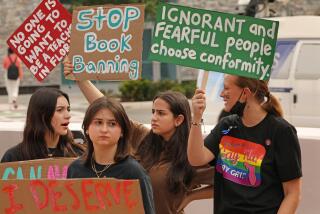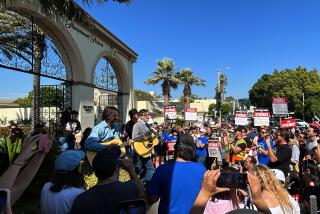Are Church Groups Allying for Anti-Rock Crusade?
Calls for warning stickers on potentially offensive pop albums have been voiced in recent years by a variety of organizations, including national parent and educational groups.
Many record industry observers, however, point to political conservatives and fundamentalist religious groups as masterminding the new legislative campaign to require record companies to put warning stickers on potentially offensive albums.
Are these forces aligned in an anti-rock crusade?
The Rev. Donald Wildmon, head of the American Family Assn. and Clear TV group that was responsible for pressuring Pepsi-Cola to drop its recent commercials featuring Madonna, denies that church groups are mounting a cohesive national anti-rock agenda.
“Are we working together? Yes, we work together on many issues,” he said in a phone interview from his office in Tupelo, Miss., the birthplace of Elvis Presley.
“Is there a national concerted effort, a No. 1 item right now, as far as rock music goes? No, there is no national agenda per se. Explicit rock lyrics are certainly considered a very important issue but they fall under the broad umbrella of family concerns.”
American Family Assn. is a Tennessee-based, 25-employee organization serving 400,000 members. AFA spearheaded the nationwide protests against “The Last Temptation of Christ,” convinced CBS-TV to excise a Mighty Mouse cartoon segment that the AFA contended depicted the hero using cocaine, and persuaded advertisers to withdraw sponsorship from NBC-TV’s “Roe vs. Wade” movie and “Saturday Night Live.” Clear TV is a sponsor-boycotting group that represents 1,600 Christian leaders with a constituency of 50 million.
According to Wildmon, each group within the pro-family movement has different priorities. He credits Christians at Focus on the Family and Media Update with being the rock music experts in the movement. Because his group focuses primarily on television, Wildmon says they do not devote a great deal of time currently to the rock lyric issue. Still, he maintains that a major backlash against offensive lyrics looms on the horizon.
“There is a certain limit to what the public will tolerate and I think many people in the rock music field have crossed that limit. The only reason there hasn’t already been a backlash is because parents are not aware of what is contained in these lyrics,” Wildmon said.
“Last year we pressured Pepsi to back out of their Madonna commercial and I think boycotting companies and sponsors supporting trash rock is a distinct possibility in the 1990s.”
The Rev. Jeff Ling, a former Parents Music Resource Center consultant well known on the anti-rock circuit, says there is a reason for the misconception that a national agenda against rock music exists. “Because there are so many conservative right-wing leaders in the church who have substantial mailing lists and media availability at their disposal, it’s easy to see how it might appear that a national conspiracy against rock is in force, but that’s hardly the case,” Ling said.
Groups sometimes aligned politically with the fundamentalist point of view also downplay the “conspiracy” theory against rock.
Shane Westhoelter, formerly of the volunteer church group Missouri Project Rock whose director co-drafted the original Missouri warning-label legislation, is the president of the St. Louis-based National Information Network, a group that claims to study the impact on juveniles of radio frequencies and backwards-recorded messages in rock music. Last year, NIN prepared a “Rock Awareness Manual,” which, according to Westhoelter, was distributed to police departments across the nation, including the Los Angeles Police Dept.
“On a scale from 1 to 10, with 1 being the highest, I would have to rate the issue of offensive rock lyrics at about 3 or 4,” Westhoelter said.
Eagle Forum head Phyllis Schlafly--perhaps the most prominent leader in the anti-abortion campaign--said in a telephone interview from Illinois that she has no objection to anyone from her organization fighting offensive lyrics, but maintains that rock music legislation is not part of her pro-life group’s national agenda. Likewise, officials at Orange County based Focus on the Family and San Diego-based Media Update expressed concern regarding objectionable rock lyrics, but dismissed the concept of a unified national attack on rock.
More to Read
The biggest entertainment stories
Get our big stories about Hollywood, film, television, music, arts, culture and more right in your inbox as soon as they publish.
You may occasionally receive promotional content from the Los Angeles Times.










